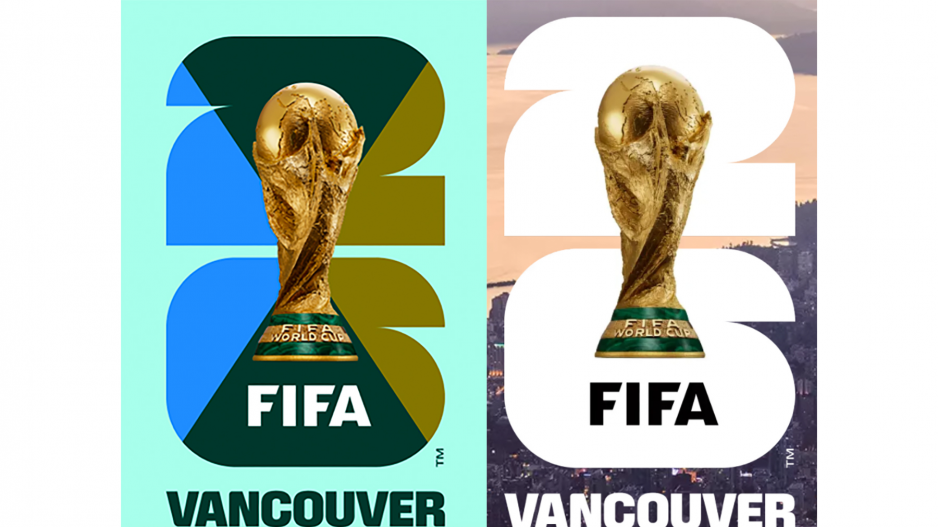The branding for the next men’s World Cup in North America shows FIFA is taking aim at the dominant sports business on the continent, says a marketing expert.
Soccer’s governing body unveiled the logo for the 2026 World Cup on Wednesday in Los Angeles, a blocky, white two stacked on top of a white six, behind the tournament’s iconic golden trophy.
On Thursday morning, FIFA released versions tailored to each of the 16 host cities, including Vancouver, which features a scheme with hues of blue, green and gold.
“Look at the overall layout. These guys clearly have aspirations,” said Lindsay Meredith, professor emeritus of marketing with Simon Fraser University. “Frankly, they're in a good position to pull it off, which is basically to supplant Super Bowl as the superpower sporting event.”
By comparison, the logo for the National Football League’s marquee annual event features the silver Vince Lombardi Trophy and Roman numerals denoting the championship number.
Meredith said FIFA also had a shrewd strategy with the plain white numerals, rather than using the flag colours associated with co-hosts U.S., Mexico and Canada.
“It's a good trick for one reason, because what it means is no, I'm not affiliated with the colours of any particular one country because everybody can kind of claim white as being a kind of a neutral statement,” Meredith said.
“It’s something kind of everybody can live with. It won't look like anybody else is getting favouritism there.”
The 104-match tournament with 48 nations over 39 days in June and July 2026 will primarily take place in the U.S., which boasts the biggest, most-modern stadiums. Under the originally planned 80-match format, the 11 U.S. cities, including Seattle, were allotted 60 matches, Vancouver and Toronto were to split 10 matches and Mexico City, Monterrey and Guadalajara the other 10.
The 26 logo has also drawn comparisons to the 2020-revealed emblem for LA 28, the Los Angeles Summer Olympics five years from now. That logo was unveiled with 26 different versions of the letter A. Meredith said FIFA is also trying to steal thunder from the International Olympic Committee in the competitive world of sports sponsorship and broadcasting rights sales.
“Unlike the Olympics, this one still seems to have a lot of cachet, value. I think what happened in the Olympics is Olympics got way too expensive, got way too political, got way too capital heavy. FIFA seem to be doing a hell of a fine job of creating a brand that's going to do it. You know, they've had their their rough goes from time to time.”
The City of Vancouver held a watch party at the Brewhall for the branding ceremony and invited handpicked media outlets, a departure from the promotional events open to all media outlets in the years leading to the Vancouver 2010 Winter Olympics.
Meredith said what won’t be different is the boosters inflating economic benefit forecasts and downplaying the costs of the mega-event.
After Toronto city hall estimated it would cost $290 million for matches there, the B.C. government announced in June 2022 that B.C. taxpayers could expect a bill of $240 million to $260 million to subsidize FIFA. But, in January, the province said the city is now responsible for $230 million. The province has not elaborated on cost estimates for B.C. Place, such as the installation of a temporary natural grass pitch and interior renovations to transform part of the B.C. Sports Hall of Fame into additional luxury suites.
The City of Vancouver has refused to release both its contract with FIFA and the business plan for how it will spend $230 million. To help raise money for the tournament, the provincial government gave it special power to levy a 2.5-per-cent accommodation tax through 2030.
Vancouver was not included in the winning three-country bid in 2018 after Premier John Horgan balked at giving FIFA a blank cheque and bidders refused to negotiate more favourable terms to B.C. Horgan changed his mind in 2021 when Montreal withdrew due to its concern over high costs.
FIFA reported record gross revenue of US$7.6 billion for the 2019-to-2022 cycle and forecast US$11 billion for the 2023-to-2026 period. It relies on local markets to pay the costs for the World Cup.



